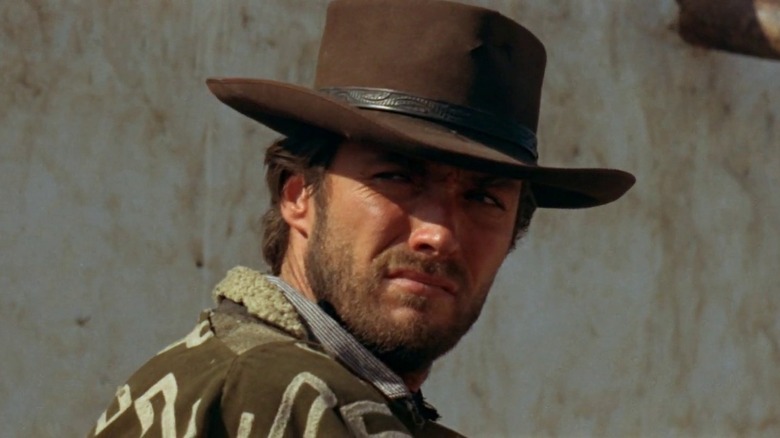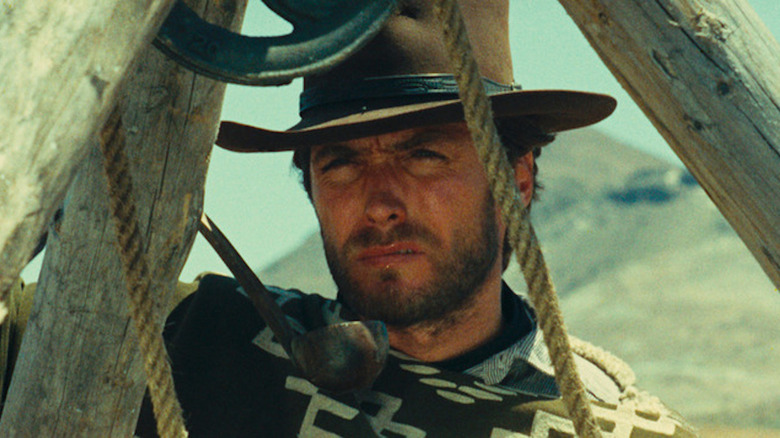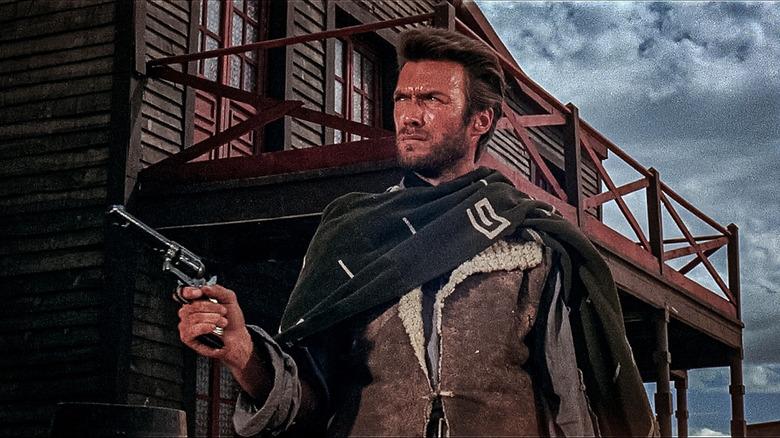A Fistful Of Dollars Remake Is A Fool's Errand - But Not For The Reason You Think
Sergio Leone's "A Fistful of Dollars" is not the greatest Spaghetti Western ever made, but it is widely considered to be the first. As the film that made Clint Eastwood an global movie star, it is inarguably the most significant. Most importantly in today's movie marketplace, people who've never seen a Spaghetti Western likely know the title, which makes it a viable candidate for a remake.
And this is fitting because "A Fistful of Dollars" is itself a remake. In fact, it was such a brazenly beat-for-beat copy of Akira Kurosawa's 1961 samurai classic "Yojimbo" that U.S. distributors wouldn't release Leone's film until the filmmaker settled up with the Japanese master and his backers at Toho (Kurosawa wound up making more money off this deal than he did with "Yojimbo").
Of course, "Yojimbo" wasn't an original either. Kurosawa openly acknowledged that his film was inspired by Stuart Heisler's 1941 adaptation of Dashiell Hammett's crime novel "The Glass Key," though the narrative of a loner wandering into a small town and pitting two rival criminal outfits against each other was clearly drawn from Hammett's "Red Harvest."
All this is to say that "A Fistful of Dollars" was a remake of an adaptation — one that also spawned "Last Man Standing," a big-screen U.S. remake in 1996 starring Bruce Willis and directed by Walter Hill. Set in Prohibition-era Texas, that film felt more like "Red Harvest" than "Yojimbo," and, given its disappointing box office performance, cooled off the property (in its various iterations) until now.
As first reported by Deadline, the Euro Gang Entertainment team of Gianni Nunnari and Simon Horsman have announced their plan to remake "A Fistful of Dollars." In other words, they are remaking the Spaghetti Western rip-off of Kurosawa's Hammett adaptation. This may make sense brand-wise, but creatively it's a depressingly awful idea.
A revolutionary Western... for 1964
Westerns, once the most reliable of Hollywood film genres, were no longer quite the guaranteed box office draw they used to be in the early 1960s. When John Ford delivered what felt like the eulogy for the classical version of the form with "The Man Who Shot Liberty Valance," the door swung open for cynical revisionists like Sam Peckinpah. If you wanted to watch morally upright cowboys contending with outlaws and rustlers, television became the venue for such conventional tales.
One of the most popular shows on TV at the time was CBS' "Rawhide," which featured a rising young star named Clint Eastwood. After several seasons of driving cattle as the upstart Rowdy Yates, Eastwood grew restless and spent his 1963 hiatus shooting an Italian-financed Western in Spain. The quick-and-cheap production — with its comparatively explicit violence, moral ambiguity and groovy Ennio Morricone score — looked and sounded unlike any Western before it. It was shocking, controversial and a commercial hit just about everywhere it played.
"A Fistful of Dollars" changed the Western forever, and announced Sergio Leone as an exciting young talent. Producer Alberto Grimaldi quickly ordered a sequel, "For a Few Dollars More," on which Leone made a startling leap forward as a filmmaker. It's a formally exhilarating work that dusts its predecessor in every narrative and technical aspect. Leone and many other talented Spaghetti Western practitioners were off and running — leaving "A Fistful of Dollars" looking quaint by comparison.
While "A Fistful of Dollars" was a hit in the U.S. when it was finally released in 1967, it was quickly overshadowed that very year by Leone's "For a Few Dollars More" and "The Good, the Bad and the Ugly." Factor in that many cinephiles had also seen Kurosawa's superior "Yojimbo," and the first installment in what became known as the "Dollars trilogy" now looked woefully derivative. It had served its purpose as a Western.
So why remake it 60 years later?
A new Fistful of Dollars should be anything but a Western
Does "A Fistful of Dollars" have serious value in 2024 as a brand name? Nunnari and Horsman (who are teaming with "Ripley" producer Enzo Sisti) certainly think so, but if they're thinking of simply running it back as an updated Spaghetti Western, I'm not sure they're going to drum up much excitement.
Everything revolutionary about "A Fistful of Dollars" was stylistic. Eastwood's poncho-clad, absurdly laconic Man with No Name set a rugged new standard for Western antiheroes, while Morricone's propulsive main theme — with its whistling, chanting and plucked electric guitar — turned film scoring in general on its ear. And then there were Leone's widescreen compositions, his mythic placement of gunslingers in the frame and striking use of extreme close-ups, which, again, he honed to steely perfection in subsequent masterpieces like "Once Upon a Time in the West."
As for the story, "Yojimbo" got to Hammett first, and, truthfully, Leone did little more than paint by numbers (hence Toho's successful lawsuit). But if these producers, who've yet to attach a director or a writer to their remake, are going to make a movie worth watching, their best bet would be to set this evergreen tale of an outsider who drives two corrupt factions — both of which are preying on a frightened populace desperate to make a lawful, peaceful living — to kill each other off in a setting with contemporary relevance. Rian Johnson launched his career by transposing "Red Harvest" and "The Glass Key" to the teen drama with "Brick." Perhaps something set in the tech world. Anywhere there's corruption, they're a way to retell this story.
Casting a bunch of hot young actors to play Spaghetti Western dress-up, however, would be creative bankruptcy and a waste of a great premise that just happens to be tied to a noteworthy IP.


